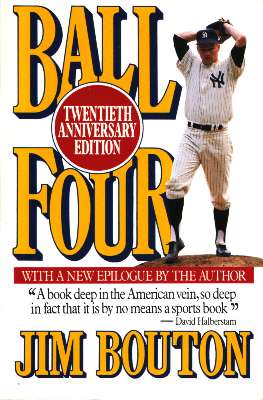Ball Four


| Click on a book's image or title to order from Amazon.com |

Ball Four
by Jim BoutonMacMillan, TPB, © 1970, 465 pp, ISBN #0-02-030665-2
Reviewed December 2005
Ball Four is a baseball classic I've actually never read before - but I'd have to say it was worth the wait.
In the 1960s, Jim Bouton had been a young star pitcher for the Yankees, before his arm started to hurt and his career started to backslide. By 1969 he was a marginal relief pitcher for the expansion Seattle Pilots (never heard of them? That's because in 1970 they moved to become the Milwaukee Brewers). However, he also had a deal to publish a book about his experiences during the season.
Many books "written" by entertainment figures - both then and now - tend to be fairly flimsy memoirs, often self-aggrandizing and not presenting any sort of larger or deeper picture. Ball Four is a clear and loud exception to the rule. Although in some ways an exposé of the game, it's really a true gem of baseball reporting, by a baseball insider. The book's magic stems from a confluence of good fortune:
- Most importantly, Bouton is an entertaining, literate and lively writer, with his own style.
- Bouton is a keen observer of people and events around him, and puts them in perspective.
- Bouton's position is unique, not in baseball, but in writing about baseball: Rather than being a star (the sorts of guys who usually write and sell memoirs), Bouton is a marginal player in a precarious position. Ironically, the story of the common man is a rarely-told one in baseball.
- Bouton is an intellectual, which additionally marginalizes him socially on the baseball team, but makes him well-suited to analyze what's going on around him.
I understand that Ball Four landed on the baseball map because the baseball establishment was outraged at the truth and detail which Bouton provided: First, he revealed that baseball players aren't heroes, that Mickey Mantle drank, that ballplayers routinely chased (or peeped at) women, that many of the players are not intellectual or moral giants. Second, he revealed just how poorly paid the marginal players were, as the minimum salary of that era was around $10,000 - which ain't so bad until you understand that many players would only draw that salary for a few years before they were out of the Majors for good. 1969 was right in the middle of the ongoing war between the baseball owners and players, which eventually led to the players' union winning the rights of free agency in 1975. Bouton says (in his additional material added in 1979 and 1989) that he testified at hearings concerning the fate of baseball's infamous (and evil) Reserve Clause, as a result of publishing his book.
But Ball Four is also a wealth of information about what it's like to be a ballplayer: Bouton goes through spring training, and gets sent to the minors a few days into the season. He wants to face his former team, the Yankees, to show them what they're missing. He's working on becoming a knuckleball pitcher (a rare and hard-to-contol pitch), but is getting very little support from his manager or pitching coach. Indeed, the pitching coach - former star pitcher Sal Maglie (who himself had a rather abbreviated career) - is generally unhappy with Bouton's approach to the game overall.
Bouton sees players get called up and sent down, he sees friends get traded to other teams, he follows his team's position in the standings, he worries about his future, and his family (he has a wife and three children, who appear in the book from time to time). He reports on the jokes players tell, and the eccentric sayings of his manager, Joe Schultz.
Also enlightening: Late in the season he's traded from the Pilots to the Houston Astros, who are in the thick of the pennant race. The Astros are ten years away from being a good team, but they're not a bad team, and the contrast between how the Pilots are run and how the Astros are run is stark: The Pilots were mired in petty politics and had no idea where they were going, or why. The Astros at least seemed to know how to treat their players, what their roles were, and what they were doing. I'm not familiar with the Astros of the era (they traded away superstar-in-waiting Joe Morgan after 1971, so they obviously had some problems in judgment), but you can look at the Astros in the book and say "this is a team that doesn't suck". You can't say that about the Pilots.
(By the way, Bouton's brief account of Joe Morgan's analysis skills is one of the priceless moments in the book. It's even funnier since we've had Morgan as a broadcaster for the last 20 years.)
At over 450 pages - including the prologue and two epilogues - it's a weighty tome, but it's worth the effort - and it's not really much effort, since you should get a good laugh every 3 or 4 pages, at least. For anyone interested in the personalities and nature of Major League Baseball, Ball Four is a gem that's not to be missed.
You can also visit Jim Bouton's official web site.
hits since 30 December 2005.